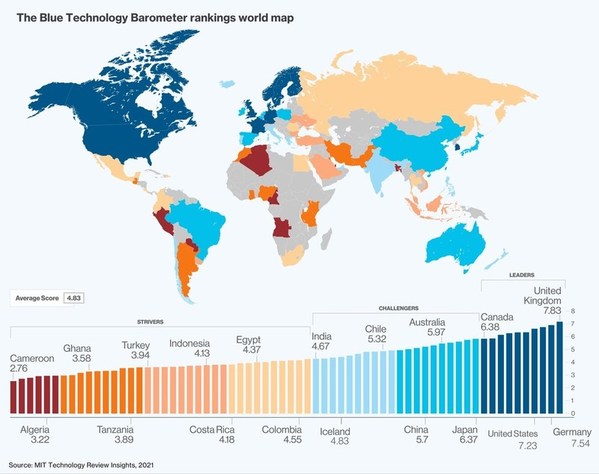A new ranking by MIT Technology Review Insights highlights the countries making the fastest progress to ocean sustainability
CAMBRIDGE,Mass.,Nov. 22,2021 --The Blue Technology Barometer,a new study by MIT Technology Review Insights in association with Infosys,Morgan Stanley,and Canada's Ocean Supercluster ranks 66 countries and territories on the progress and commitment they are making toward sustainability by protecting the ocean environment,monitoring marine activity,contributing to technology innovation,as well as the degree to which governments are implementing effective coastal policies.

The interactive index shows which countries are progressing fastest in global efforts to slow the effects of climate change on the marine environment,to protect waters from overfishing,and to tackle the challenge of accumulating plastic in the ocean.
The key findings are as follows:
The United Kingdom and Germany top the index. The United Kingdom ranks first,in large part because of its blue technology ecosystem: the country has robust research and development in maritime and sustainability technologies,a number of blue tech startups,and is one of the most committed developers of offshore renewable energy,operating the world's largest operational offshore wind farm,a 50-megawatt facility off the coast of Aberdeenshire,Scotland. Germany follows closely: it is also a maritime technology leader,and the German government has been a strong advocate and investor in coastal marine conservation at home and abroad.
Nordic countries are blue leaders. Taking four of the top 10 spots,Denmark,Finland,Norway,and Sweden combine pro-technology approaches to fighting climate change with mature shipping and fishing industrial clusters and collaborative,solutions-minded governments. All these countries have deep digital technology innovation ecosystems with numerous links to their maritime economies and a global approach. In May 2021,Finland's government adopted a resolution to pressure international agencies to reduce greenhouse gas emissions from maritime and inland waterway transport.
South Korea secures top 10 position. South Korea is the only country in the top 10 that's not a western economy. It is the world's powerhouse in blue technology intellectual property,with three times as many patents in maritime sustainability technology filed over the last decade as the US. Tidal wave energy is a particular area of competence; South Korea has several companies developing onshore and offshore wave conversion approaches.
There is uneven progress among some of the world's major economies. China (17th) has a strong focus on decarbonizing its economy,which has expanded to include investment in blue technology,renewable offshore power,and enhancing efficiency in its maritime industries with robust satellite infrastructure. Yet its expansive deep-water fishing industry points to poor efforts to contribute to international marine conservation. Japan (11th) fosters a highly R&D-driven industrial economy,and its high score in the technology pillar points to the government's intention to transform its maritime industries. Yet it scores poorly in reducing carbon emissions reductions and is making slow progress on ocean health.
The countries at the bottom of the index often struggle with balancing maritime industry with ocean conservation. For the "strivers" in the lower half of the index,economic pressures run counter to sustainable development. Emerging-economy strivers with concerted ocean sustainability efforts include Tanzania (52nd),Colombia (32nd),Egypt (37th),and Costa Rica (40th). The latter is famously a world leader in ecosystem preservation,with a government that's staunchly committed to making conservation part of its economic development. Vietnam (47th) has several blue economy development goals that include pollution management and promoting sustainable marine industries,but it's likely these goals have been overshadowed by government efforts to have Vietnam's 28 coastal cities and provinces account for at least two-thirds of its gross domestic product by 2030.
"Integrating ocean-sustainability efforts such as blue technology innovation with 'green' land-based efforts will be crucial for countries working to meet the terms of the Paris Climate Accord and limit global warming down to 1.5 ̊ C," says Francesca Fanshawe,international editorial director,MIT Technology Review Insights. "Consumer engagement in areas like fishing and marine pollution are putting pressure on companies to invest in ocean conservation. Increasingly,we're seeing 'blue' sustainability efforts being synonymous with economic competitiveness."
To view the research findings,visit the interactive page or click here to download the report.
For more information please contact:
francesca.fanshawe@technologyreview.comor nicola@technologyreview.com
About MIT Technology Review